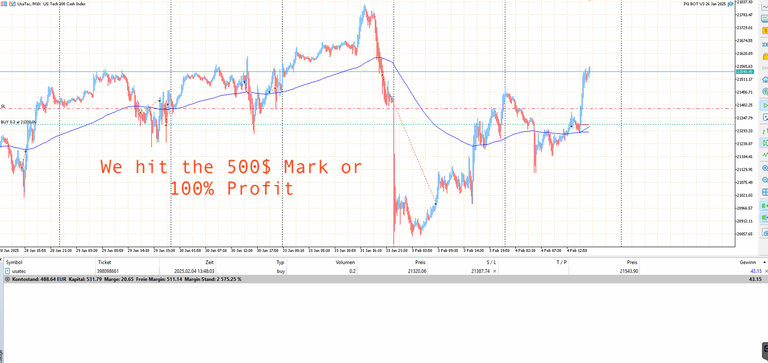
Trade Tariffs as an Opportunity for Greater Diversity?
Trade tariffs are gradually becoming more concrete, and global concerns are rising as a result. Some decrees have already been revised or postponed, but the fundamental idea remains. Punitive tariffs will cause disruptions in global trade, but does this always have to be a bad thing?
For example, the U.S. sees the large trade deficit with the EU as a thorn in its side. While the goods that leave our ports daily are one thing, does the same apply to services? The U.S. produces very few goods for the world, but in terms of services, it is far ahead. Many corporations here in Germany depend on American software providers, and this relationship is clearly in favor of the U.S.
Will we now experience a full-blown trade war, or is there still a chance? One solution could be increased imports of U.S. goods, as we rarely see American food products on our shelves. However, during my recent research in a Kaufland store, I noticed something: the first bags of chips from the U.S. are now available here, albeit only for special occasions. Personally, I wouldn’t mind Argentine meat, Cheetos, coffee creamer, and other products from there.
Even if domestic production suffers and regional products are considered sacred by many, a pragmatic solution will be necessary. Trump is a dealmaker, and that’s exactly what we need to be now, as a new wind is blowing. I assume that we won’t be able to do without many services from the U.S., and imports of oil, gas, and food could be a compromise.
The issue of cars could also be a good way to kill two birds with one stone. Germany needs affordable cars, and these have not been produced in Germany for a long time. Luxury models might still be an exception, but affordable cars like the Golf, for example, are manufactured in Mexico. If we set aside ideology and focus on the facts, I don’t see any reason to impose tariffs on Chinese cars either. After all, they could address a major concern for Germans: how to get from A to B cost-effectively.
The major trade war between China and the U.S. is likely just beginning, and cheap goods could flood secondary markets. An oversupply drastically reduces prices, and low prices naturally attract bargain hunters. In our current situation, is it even possible to pass up such opportunities?
Market Report: Impact of U.S. Tariffs on International Trade
The tariffs imposed by the U.S. on various goods have both direct and indirect effects on prices and the availability of products in Germany:
Tariff Overview
Here is an overview of existing and planned U.S. tariffs, as well as planned tariffs from other countries:
| Country | Tariff Type | Goods | Tariff Rate (%) | Effective From |
|---|---|---|---|---|
| USA | Import Tariff | All Goods from China | 10 | 02/04/2025 |
| USA | Import Tariff | All Goods from Mexico | 25 | 02/02/2025 |
| USA | Import Tariff | All Goods from Canada | 10 | 02/02/2025 |
| Canada | Counter Tariff | U.S. Goods | 25 | Unknown |
| China | Counter Tariff | U.S. Goods | 15 | 02/10/2025 |

Die Handelzölle als Chance für mehr Vielfalt ?
Die Handelszölle werden langsam konkreter, und die weltweite Angst steigt auch diesbezüglich. Einige Erlasse wurden bereits schon wieder revidiert oder auf später verschoben aber der Grundgedanke bleibt. Strafzölle werden für Verwerfungen sorgen im globalen Handel aber muss das immer nur schlecht sein?
Die USA sieht das große Handelsdefizit beispielsweise mit der EU, und das ist ihm ein Dorn im Auge. Nun sind die Waren die täglich unsere Häfen verlassen eine Sache aber gilt es auch für Dienstleistungen? Die USA produzieren zwar nur sehr wenige Güter für die Welt, aber in Sachen Dienstleistungen sind sie weit vorne. Viele Konzerne hier in Deutschland sind von amerikanischen Softwaredienstleistern abhängig und dieses Verhältnis ist klar, zu Gunsten der USA zu sehen.
Werden wir jetzt den totalen Handelskrieg erleben oder gibt es noch eine Chance?
Eine Lösung könnte der verstärkte Import von US amerikanischen Waren sein, denn Lebensmittel sehen wir nur sehr selten in unseren Regalen. In meiner letzten Recherche in einem Kaufland ist mir dann aber doch was aufgefallen, die ersten Chipspackungen aus den USA sind mittlerweile auch hier erhältlich, wenn auch nur zu speziellen Anlässen. Ich persönlich hätte nichts gegen argentinisches Fleisch, Cheetos, Kaffee-Crema und was es noch alles an Produkten dort gibt.
Auch wenn einheimische Produktion darunter leiden wird und regionale Erzeugnisse bei vielen der heilige Gral ist, so pragmatisch wird eine Lösung aussehen müssen. Trump ist ein Deal Maker und genau sowas müssen wir jetzt auch sein, denn es wird ein neuer Wind wehen. Ich schätze mal, auf viele Dienstleistungen werden wir nicht verzichten können aus den USA und Import von Öl, Gas und Nahrungsmitteln wäre ein Kompromiss.
Das große Thema Auto wäre auch ein guter Grund, um zwei Fliegen mit einer Klappe zu schlagen. Deutschland braucht günstige Automobile und die werden schon lange nicht mehr in Deutschland hergestellt. Luxusmodelle sind vielleicht noch eine Ausnahme aber günstige Autos beispielsweise Golf etc. werden in Mexiko hergestellt. Lässt man jetzt die Ideologie mal weg und fokussiert sich auf die Fakten, dann sehe ich eigentlich auch keinen Grund auf chinesische Autos Zölle zu veranschlagen, diese würden schließlich eine große Sorge der deutschen nehmen, wie komme ich kostengünstig von A nach B.
Der große Handelskrieg zwischen China und den USA wird wohl erst starten und billige Waren könnten somit sekundäre Märkte fluten. Eine Überangebot reduziert drastisch die Preise und günstige Preise lockt automatisch die Schnäppchenjäger an. Ist es in unserer heutigen Lage überhaupt noch möglich auf solche Chancen zu verzichten?
Marktbericht: Auswirkungen der US-Zölle auf den internationalen Handel
Die Zölle, die die USA auf verschiedene Waren erheben, haben sowohl direkte als auch indirekte Auswirkungen auf die Preise und die Verfügbarkeit von Produkten in Deutschland:
Zollübersicht
Hier ist eine Übersicht der bestehenden und geplanten Zölle aus den USA sowie der geplanten Zölle aus anderen Ländern:
| Land | Zolltyp | Waren | Zollsatz (%) | Gültig ab |
|---|---|---|---|---|
| USA | Importzoll | Alle Waren aus China | 10 | 04.02.2025 |
| USA | Importzoll | Alle Waren aus Mexiko | 25 | 02.02.2025 |
| USA | Importzoll | Alle Waren aus Kanada | 10 | 02.02.2025 |
| Kanada | Gegenzoll | US-Waren | 25 | Unbekannt |
| China | Gegenzoll | US-Waren | 15 | 10.02.2025 |